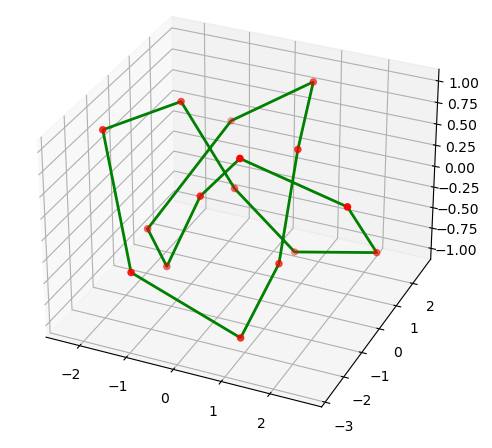Let us consider fixed points in space, if we apply the well-known Traveling Salesperson Problem algorithm, we get the shortest route. It can give a nontrivial knot in the three-space. The question is what is the minimum number of points that can be like this, i.e. "TSP non-trivial"?
I have found $16$ points, but don't know if we can get less.
The coordinates for the example are:
[[-2.35172872, 0.87499447, -0.86062952],
[-1.27279499, -0.58250424, -0.79981732],
[-0.35964634, -0.96662397, 0.24847584],
[ 0.77356703, -1.69027479, 0.9899925 ],
[ 2.68106959, -0.99753048, 0.50923161],
[ 2.54586669, 1.16513512, -0.60024349],
[ 0.61077421, 1.64158209, -0.96863809],
[-0.42031143, 0.91839722, -0.14112001],
[-1.39719379, 0.51984603, 0.86062952],
[-2.36439472, -1.0820831 , 0.79981732],
[-1.03519417, -2.78229854, -0.24847584],
[ 0.89102032, -1.94691491, -0.9899925 ],
[ 1.06785291, -0.39731003, -0.50923161],
[ 1.09132302, 0.49945222, 0.60024349],
[ 0.78406629, 2.10734042, 0.96863809],
[-1.24427592, 2.71879248, 0.14112001]]

